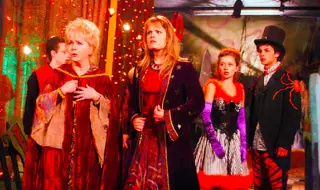For many, solar eclipses are a very relaxing sight that helps them appreciate the beauty of nature. They don’t come around often, but when they do the sight is as beautiful and unique as it is rare. Solar eclipses are natural events that take place when the moon orbits itself between Earth and the Sun, blocking out sunlight. Eclipses can only be viewed from certain parts of the world and are sometimes called occultations.
 Discover Magazine Blogs
Discover Magazine Blogs
Eclipses are able to occur because the distance between the Sun and the Earth is about 400 times the distance between the Moon and the Sun. The Sun’s diameter is approximately 400 times larger than the Moon’s. With all these factors in play, it is then possible for the Moon to give the illusion that it’s the same size as the Sun and effectively casts a large shadow across Earth.
 The New York Times
The New York Times
There are a few various types of solar eclipses. Partial solar eclipses occur when the moon doesn’t line up perfectly with the Sun and some of the Sun’s light is still able to reach earth. In instances such as this, the Sun appears to wane the same way a crescent moon would. An annual solar eclipse happens when the Moon and Sun are lined up exactly but there’s some disparity in terms of distance between the planets. The Earth is either too far from the Moon or too close to the Sun.
 Astronomy Magazine
Astronomy Magazine
Total solar eclipses are the most visually stunning of all, and also the rarest. In these cases, the moon completely covers the entire Sun when viewed properly. It’s essentially the same as it being night out when an area is affected by a “Totality”. It’s cool to see as well as disorienting, so people tend to make a big deal when a total eclipse comes to town.
 Svalbard 2015
Svalbard 2015
Each year there are between two and five solar eclipses, drawing the attention of stargazers and space enthusiasts alike. They’re often brief, as the speed of the Moon as it moves across the Sun is about 1,400 miles per hour. The longest Totalities have been known to last up to seven and a half minutes, and only occur about every 18 months. For some space fans, a Totality is almost like a large competitive sporting match.
 NASA
NASA
As it turns out, there’s supposed to be a total eclipse in 2017. For everything you need to know about watching this eclipse, read on.
You know what was one subject that I wish we could have covered in any science class growing up in school? Sleep science. If you really think about it, the subject itself is appropriate for any age, and I would have absolutely volunteered for any kind of experiment.
 Mk Knowledge Builders
Mk Knowledge Builders
Let me clarify, first off, YES there is such a thing as sleep science. I mean why not!? It is a phenomenon don’t you think? Sleep is the single greatest thing I think we as human can experience. Yes, I think it is better than experiencing love, because sleep does not break your heart.
 Dreams
Dreams
Plus it’s like time you can’t account for. We need sleep, we need it so badly, if you feel you physically can’t function due to lack of sleep you are excused for the day. So of course there is a science to it, we need to understand this essential part of our well beings.
 Flickr
Flickr
Despite how much has already been learned about what happens to our bodies when we sleep, there is one aspect of it all that still baffles scientists and has researchers working around the clock.
 Steemit
Steemit
They are all wondering, probably just like you and I, what happens to our brains when we sleep? Well, one short answer is we dream, and okay you’re not technically wrong, but this marvel just goes to show the intense power our brains hold.
 Pixabay
Pixabay
So does that mean that our brains need dreaming to do whatever it is they do while our bodies rest? It’s as close to alien as we get and there is still so much to be understood.
Most of our bodily functions, no matter how odd or disgusting, serve a purpose. Why do we cough? To clear our throat and rid our breathing passage of foreign particles. Why do we vomit? To eliminate poison and contaminates from our body. Burping and farting are to get rid of bacteria-in fact a lot of what we do is just expelling stuff from the body.
 lh3.ggpht.com
lh3.ggpht.com
But what about hiccups? It’s something we don’t often think about until it actually happens. Especially since unlike burping or farting, it doesn’t happen daily. It is also different from coughing and vomiting, because those things are usually brought on by swallowing wrong or consuming rancid or poisonous food.
 pixabay
pixabay
Sure, sometimes you hiccup after a large amount of water, but a lot of times hiccups just seem to occur randomly, stopping by in your life for a short but annoying visit before moving on. Unlike yawning- which serves a behavioral function of attempting to get animals to sleep in groups, hiccups are not contagious.
 flickr
flickr
Hiccups don’t help you breath like inhaling, hiccups don’t clear your throat, hiccups don’t eliminate bacteria, hiccups can’t be controlled or stopped or used to irritate like a well-timed expulsion of gas from your mouth or butt. In fact, hiccups serve no health benefit whatsoever. So why do we do it?
 pixabay
pixabay
In fact, the only purpose hiccups do serve is providing entertainment. When someone else has them, we ask them about a topic we know they are interested in, or purposefully rile them up about something they are passionate about so we can watch them struggle through sentences.
 flickr
flickr
On television, hiccups are used a plot device on various sitcoms so we can watch our favorite character trying out the many hiccup home remedies along with the mandatory over-the-top response of visiting their local doctor. Comedy gold.
You know when you’re drinking a delicious bottle of Snapple, you do the whole traditional thing where you turn the cap over and read that super fun fact and boom you feel a little smarter? Or maybe you’re just a regular geek, like myself, that watches Mythbusters or any other kind of fact checking show. It’s okay to be naturally curious on this certain subject, granted that it’s sort of horrifying. If you’re an arachnophobia, you’re really going to want to bust this myth because if it is true… Well, let’s not go there yet. Let’s look over the hard evidence and then decide for ourselves.
 Wikipedia
Wikipedia
I’m sure you’ve heard it a million times, read it on a few Snapple bottle caps, and maybe even experienced it yourself, but according to word of mouth since like 1993, humans eat an average of 8 spiders in their sleep in our lifetimes. If you’ve heard this before from your friend’s cousin’s neighbor who heard it from his sister’s friend from school, then you may have noticed the number changes depending on who you ask.
 Wikimedia
Wikimedia
Some people says it’s three, others eight, and still others might say as many as several dozen. Could it be true? Could spiders really be climbing into our mouths at night? If not, how come so many of us have swallowed this as fact? The BBC conducted a survey on their Facebook Earth page and asked the public.
 Wikimedia
Wikimedia
The answers varied from, “I don’t want to know,” to “If this is true I’m bandaging my mouth up.” Well, here’s what we do know for a fact, spiders have been known to inhabit ear canals. We saw a case like this in China, when a woman went to Changsha Central Hospital of Otolaryngology and Head and Neck Surgery with an itchy ear. Similarly, in 2014 the singer Katie Melua revealed that a jumping spider had hitch-hiked its way into her auditory canal on a pair of earbud headphones.
 Wikimedia
Wikimedia
Medically speaking, there are cases of spiders biting people whilst they sleep. A study done in Australia claims the white-tail spider bites around one in three people in their sleep. We also know that Recluse spiders are mostly active at night and can give a bad enough bite to send people to hospital. However, taking a closer look at these injuries anyone will find that if bitten, they tend to be on a limb, hand or foot.
 Wikimedia
Wikimedia
Yeah, this all sounds absolutely frightening, and with living in different regions, who’s to say you’ll get a visit from any innocent spider in your slumber? Fortunately, we have good news for you.




